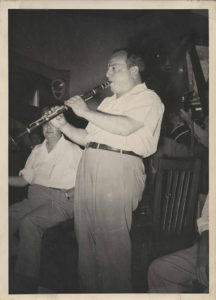Johnny Wiggs
Johnny Wiggs was a Jewish traditional jazz cornetist from New Orleans.

Courtesy of Louisiana State Museum
Johnny Wiggs and Boojie Centobie. Unidentified
One of the few Jewish cornet players of his time, Johnny Wiggs, also known as Johnny Hyman, was a traditional jazz cornetist from New Orleans. Early in his career Wiggs distinguished himself for his talents as an instrumentalist. he also taught music to many future New Orleans musicians, including Jack Delaney, George Girard, Milton Scheurmann, and Pete Fountain. A founder of the New Orleans Jazz Club, Wiggs was a central figure in the post-World War II jazz revival.
Wiggs was born John Wiggington Hyman on July 25, 1899, in New Orleans. Born to John Meleton Hyman–son of the chief justice of the Louisiana Supreme Court, William Bryan Hyman (a relative of William Jennings Bryan)–and Alice Wood Wigginton, Wiggs came from a prominent Jewish New Orleans family. Wiggs’s uncle drafted the ordinance that created Storyville, the red-light district that would play a central role in the history of jazz. A childhood friend of Joseph “Wingy” Manone, Wiggs began his musical career on violin but soon switched to cornet after hearing King Oliver perform. Along with Bix Beiderbecke, King Oliver would become one of Wiggs’s primary musical influences. The family also moved to Ocean Springs, Mississippi, for a time, thus exposing Wiggs to live musical traditions outside New Orleans.
Some of Wiggs’s earliest gigs were as a cornetist in dance bands. He relocated to New York early in his career but soon returned to New Orleans, where he took several long-term teaching jobs, including as a high school architectural drawing teacher and as a musical tutor. Long after Wiggs had stopped teaching, many locals continued to refer to him as “Professor Hyman.”
His first recordings came with Tony Parenti on the Columbia record label, and in 1927 he recorded with his own group, Johnny Hyman’s Bayou Stompers, on the Victor label. Due to the Orleans Parish School Board’s unfavorable attitude toward jazz during that time, he changed his performing name to Wiggs. Even in the 1920s, when Wiggs gigged the most, he also worked as a journalist and merchant seaman. He would lead the Stompers as well as a number of other groups during his long career.
From 1946 on, Wiggs was a central figure in the post-World War II jazz revival, as he was a founder of the New Orleans Jazz Club and helped to bring many great jazzmen out of involuntary retirement. The 1950s are usually said to be Wiggs’s most prolific time, as he recorded frequently and played an important local role in the jazz community. Wiggs was a composer as well, and many of his tunes––“Congo Square,” “King Zulu Parade,” “Canal Street March”––are now well known in the various jazz repertoires of New Orleans and beyond.
Wiggs died in New Orleans on October 9, 1977.
